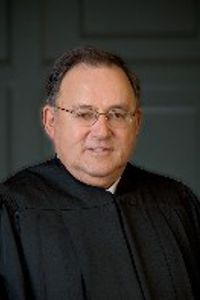Michael McCormack
Michael McCormack is a former justice of the Nebraska Supreme Court. He was appointed to the court on March 19, 1997 by Governor Ben Nelson. McCormack was retained by voters in 2012.
McCormack retired from the court on January 1, 2016.[1]
Education
McCormack earned his J.D. from Creighton University School of Law in 1963.[2]
Career
- 1997-2018: Justice, Nebraska Supreme Court
- 1966-1997: Attorney in private practice
- 1963-1966: Assistant Public Defender, Douglas County[2]
Elections
2012
McCormack was retained in the general election on November 6, winning 70.36% of the vote.[3][4]
- See also: Nebraska judicial elections, 2012
2012 judicial performance evaluation
Every two years, the Nebraska State Bar Association compiles responses from lawyers to evaluate judges in the state. Subjects are rated in seven categories, then a determination is made for whether the judge should be retained. The seven categories considered are: legal analysis; impartiality; attentiveness; opinions; judicial temperament and demeanor; appropriate communication; and timeliness.
90 percent of respondents stated that Justice McCormack should be retained in office. To read the full evaluation, see: Nebraska State Bar Association, 2012 Evaluation Results.
2006
He was retained by voters, winning 75% of the vote.[5]
2000
He was retained by voters in 2000 with 75% of the vote.[6]
Political ideology
In October 2012, political science professors Adam Bonica and Michael Woodruff of Stanford University attempted to determine the partisan ideology of state supreme court justices. They created a scoring system in which a score above 0 indicated a more conservative-leaning ideology, while scores below 0 were more liberal.
McCormack received a campaign finance score of -0.21, indicating a liberal ideological leaning. This was more liberal than the average score of -0.18 that justices received in Nebraska.
The study was based on data from campaign contributions by the judges themselves, the partisan leaning of those who contributed to the judges' campaigns, or, in the absence of elections, the ideology of the appointing body (governor or legislature). This study was not a definitive label of a justice, but an academic summary of various relevant factors.[7]
See also
External links
- Official website of the Nebraska judiciary
- Nebraska Judicial Branch, Michael McCormack - District 4
- Project Vote Smart, Justice Michael McCormack (NE)
- Indiapost.com, "Nebraska high court backs Guatemalan mom," March, 7, 2009 (dead link)
- Legal Newsline, "Nebraska court rules in hostile work environment case," August 23, 2008
- Lincoln Journal Star, "Nebraska Supreme Court justice to retire in January," November 19, 2015
Footnotes
- ↑ Riley Johnson, Lincoln Journal Star, "Nebraska Supreme Court justice to retire in January," November 19, 2015
- ↑ 2.0 2.1 Justice McCormack bio from Nebraska Courts
- ↑ Nebraska Secretary of State, "Official Results of Nebraska General Election - November 6, 2012," accessed October 9, 2015
- ↑ Nebraska Secretary of State, "Judicial Candidate List for retention in office," July 16, 2012
- ↑ 2006 Judicial retention election results
- ↑ 2000 Judicial retention election results
- ↑ Stanford University, "State Supreme Court Ideology and 'New Style' Judicial Campaigns," October 31, 2012
Federal courts:
Eighth Circuit Court of Appeals • U.S. District Court: District of Nebraska • U.S. Bankruptcy Court: District of Nebraska
State courts:
Nebraska Supreme Court • Nebraska Court of Appeals • Nebraska District Courts • Nebraska County Courts • Nebraska Separate Juvenile Courts • Nebraska Workers' Compensation Court • Nebraska Problem-Solving Courts
State resources:
Courts in Nebraska • Nebraska judicial elections • Judicial selection in Nebraska




